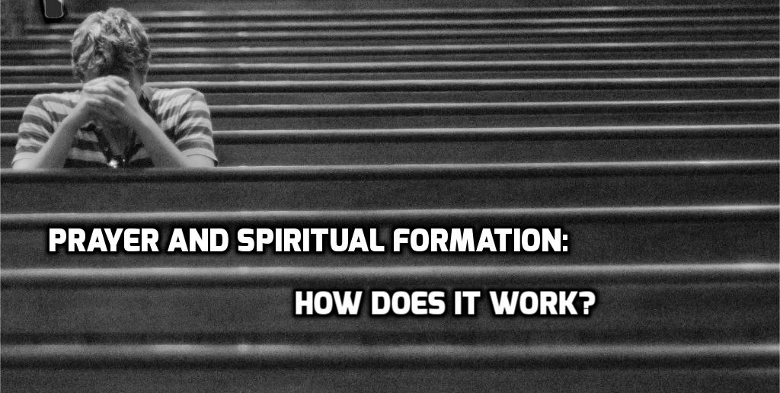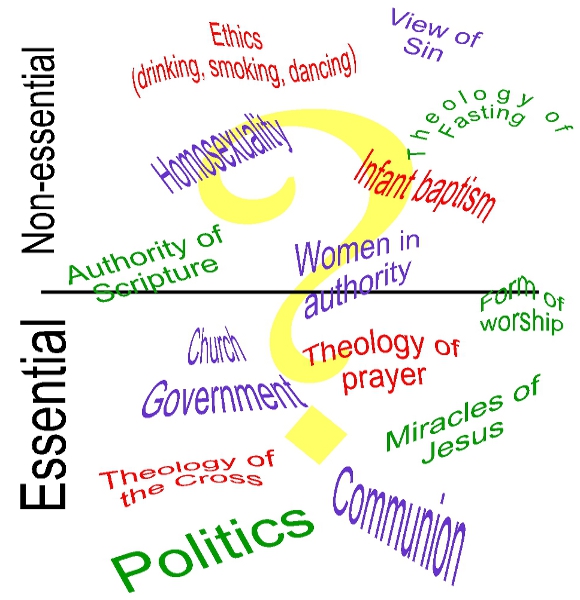Theology Articles
Theology: Articles on theology, heresy, doctrine and life from the Wednesday in the Word, the podcast about what the Bible means and how we know
Theology Articles

Do we work at sanctification? A lesson in discernment
Examining the connection between ideas is a useful tool for Bible study and discernment. As practice in discernment, find the wrong turn in the following argument.

What does it mean to “fear” God?
In biblical terms, the word “fear” does not usually focus on feelings of terror or fright. “Fear” is a motivating emotion. We use “fear” to determine what we will do in any given situation.

How do we know the Bible is the Word of God?
How do we know the Bible is the Word of God? First, we can examine what the Bible claims about itself.

Why bother with Jesus when I’ve got it made?
Professor Ken Elzinga answers the question: If your life is going great, why should you bother with Jesus?

What is Theology?
“One is sometimes (not often) glad not to be a great theologian; one might so easily mistake it for being a good Christian.” – C.S. Lewis

What church positions are open to women?
This table shows the spectrum of church leadership roles available to women under the egalitarian and hard/soft complementarian views. Individual churches may vary in their practice.

What is a soft complementarian?
The views regarding women in authority in the church can be generalized into 3 basic positions: hard complementarian (most restrictive), soft complementarian (less restrictive), and egalitarian (least restrictive). This is a summary of the soft complementarian position.

What is a hard complementarian?
The views regarding women in authority in the church can be generalized into 3 basic positions: hard complementarian (most restrictive), soft complementarian (less restrictive), and egalitarian (least restrictive). This is a summary of the hard complementarian position.

What is an egalitarian?
The views regarding women in authority in the church can be generalized into 3 basic positions: hard complementarian (most restrictive), soft complementarian (less restrictive), and egalitarian (least restrictive). This is a summary of the egalitarian position.

Ecclesiastes: The spiritual basis for your life plan
At my financial planning firm, we like to challenge our clients to answer the question: What is the money for? The answer that most disappoints me is: “I’m not going to live that long.” That is not a life plan; it is a death plan. If you feel that way, then the book of Ecclesiastes is for you.

The Lord’s Prayer: we say it but what does it mean?
The more I study the Lord’s Prayer, the more I conclude the prayer asks for one and only one thing: that God would make us completely righteous once and for all.

Spiritual Formation: a critical look
The theology of Spiritual Formation sounds great on paper, but it is focused on the wrong target, seeks the wrong kind of change and misses the mark on how disciplines work.

Prayer and Spiritual Formation: How does it work?
The biblical picture of prayer is not that it is a spiritual discipline that I use to reach a higher spiritual level. Rather prayer is an unavoidable mandatory battlefield in the war of faith.

Does Spiritual Formation seek the right kind of change?
Not only does the theology of spiritual formation aim at the wrong target, spiritual formation seeks the wrong kind of change. While spiritual disciplines focus on success at outward righteous behavior, the Bible teaches that the goal of spiritual maturity is a strong unshakeable faith.

Is Spiritual Formation shooting at the right target?
The theology of Spiritual Formation sounds great on paper, but it is focused on the wrong target. Spiritual formation is “an intentional Christian practice with the goal of developing spiritual maturity that leads to Christ-likeness.” The central claim of...

What is worship?
If you think that worship equals singing, A Taste of Heaven: Worship in the Light of Eternity by RC Sproul is a must-read book for you.

Does Spiritual Formation work? Answers from Haggai
"Spiritual formation" is a hot topic today. But does it work? The Old Testament prophet Haggai would answer no. Spiritual formation is "an intentional Christian practice with the goal of developing spiritual maturity that leads to Christ-likeness." This...

The Boy Jesus in the Temple and what that teaches us about Bible Study
How could a 12-year old astonish the best theologians of his day? Why was the knowledge of Jesus radically different than everyone else?

Drawing the Doctrinal Line
Which of our many doctrinal differences should Christians worry about? After all, one person’s heresy is another person’s minor difference of opinion.

Why I reject Emergent Theology
Emergent Theology claims theological certainty is an idol, but Paul claims the authority to speak on behalf of God.

5 Questions to Identify a Cult
How do you recognize a group which claims to represent genuine, apostolic Christianity but in reality does not? Here are 5 questions that separate “the sheep” from “the wolves.”

7 Marks of False Teachers
I blog frequently on tips and tools for improving your Bible study skills, but what about discernment when listening to others?

God is light
In 1 John, the Apostle John is writing to clarify the true gospel from the false gospels spreading through the early church. His first point is God is holy and you are not.

Why calling does not begin with marriage
Does God have a “one-plan-fits-all” calling for women: marry, conceive children, raise children and become a grandmother?

The purpose of 2 John and 3 John
2 & 3 John contain the same ideas as 1 John. So what was the purpose of these short letters?

What does it mean to abide in Christ?
Understanding what it means to “abide in Christ” is one of the major themes of 1 John.

Who are you listening to?
Today we often seek preachers who tell us stories, make us laugh, and tickle our ears with poetry and platitudes. We would rather listen to Jon Stewart than Jonathan Edwards. We ought to think critically about how far we have slipped down the slope of valuing style over substance.

Lance Armstrong and fallen heroes
Fallen heroes teach us that we need more than an earthly hero. Throughout biblical history, God gave us fallen heroes and failed solutions to prepare us for the only solution that works.

Solomon’s wisdom and last resorts
Solomon had real wisdom to offer a broken world. Yet, he failed to learn the most important lesson: Solomon valued the gift of wisdom more than the Giver of the gift.

The Vow of Jephthah
The story is tragic in part because he expected an animal, but also because his vow reveals his lack of faith in God.

Prayer and rain: Does God answer prayer?
Why should I have confidence that God answers my prayers? According to James, I have confidence that my prayers will be answered because of who is answering my prayer, not because my prayer is perfect, powerful or articulate.

Questioning desire
Desires play a key role in the life of faith. The question is how we handle our desires and whether we are willing to listen to what God says about them.

Finding the Will of God
If we accept the fact that God is our Father, our Provider and our Redeemer, does it make sense that He would hide His will from us? Yet many Christians talk about the “will of God” as if finding it is a version of the con man’s three-shell game.

Galatians, James and “social justice”
In his critique of Tim Keller’s Generous Justice, Giere refers to Galatians and points to a major theme of James. Do James and Paul offer a litmus test of saving faith?
Top Banner Photo by John Gibbons on Unsplash
